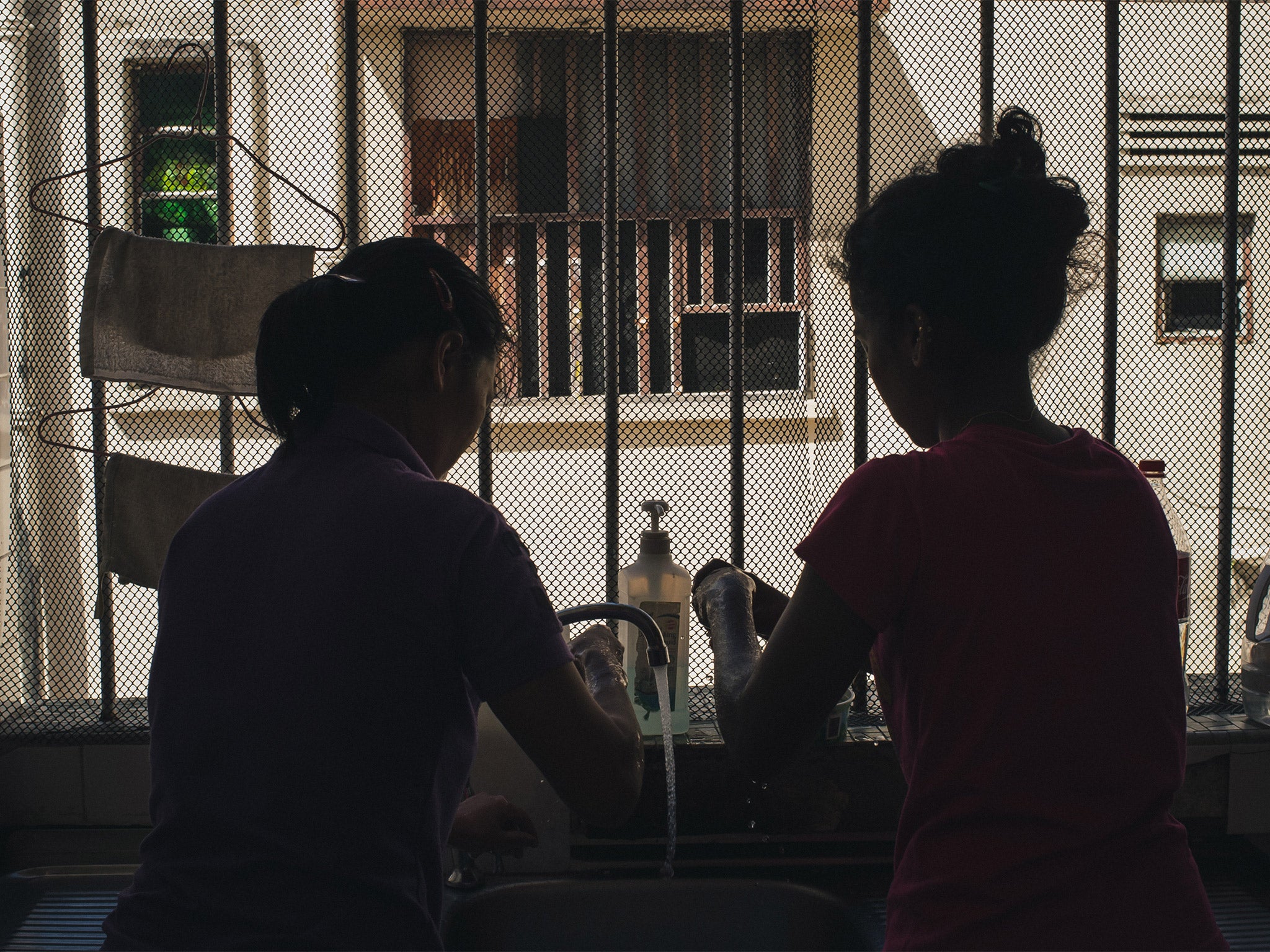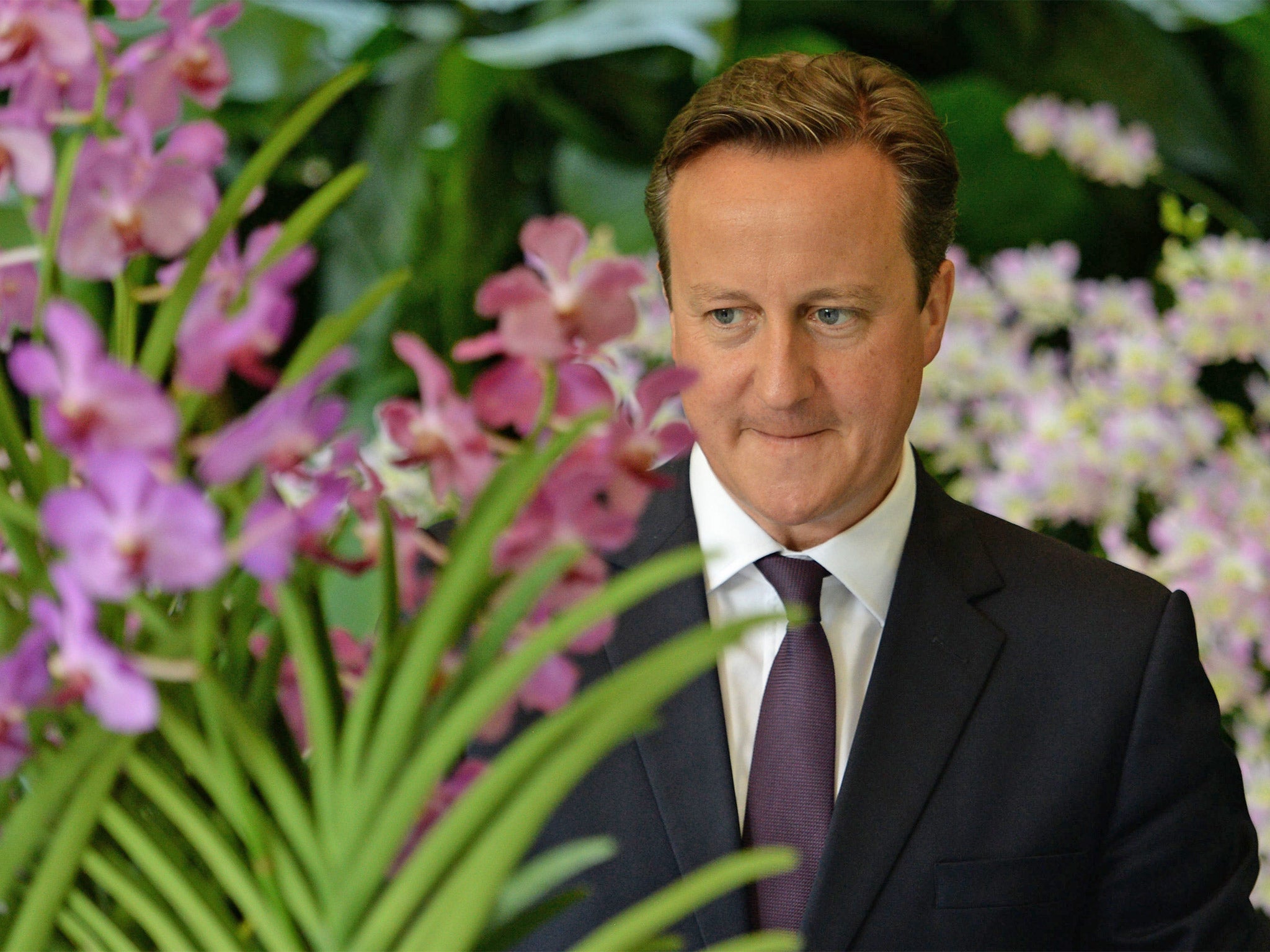Singapore's domestic workers routinely exploited and often abused in the service of rich nationals
David Cameron was shown the country's shiniest veneer on his tour this week. What he didn't see was the plight of the army of foreign women working there

Christine’s eyes narrow and her bottom lip shakes when she talks about her former Singapore employer who beat her for taking a biscuit from the kitchen. “She got really angry with me, and after that point she started to hit me every time I irritated her,” she says.
After six months, she decided to run away. A friend had told her about a shelter that looked after domestic workers run by the Humanitarian Organisation for Migration Economics (Home), a Singapore charity that supports domestic workers.
The house has around 50 residents, all runaways, and sits on a typical Singapore street, with a chicken and rice shop, a hawker centre and a grocery store nearby.
In any given week, Home estimates that more than 10 new runaway domestic workers will arrive on their doorstep. The three-storey house currently has residents from the Philippines, Indonesia, Burma, India, Sri Lanka and Bangladesh.
Singapore is painted as a land of opportunity, where you have an outside chance of one day returning home better off than when you left. Indeed, David Cameron, was here to promote British business and trade. There he visited the National Singapore Botanic Gardens and had an orchid named in his honour – Papilionanda David Cameron.
But Singapore depends on the work of low-skilled domestic workers to support its 4.5 million population. A workforce of more than 220,000 women – many from the Philippines and Indonesia – labour to keep Singapore households ticking over, doing domestic chores such as cooking, cleaning and caring for children, the elderly and disabled.
Home’s shelter last year helped 750 domestic workers and reported 97 cases of physical abuse, 19 cases of sexual harassment and 333 cases of verbal/psychological abuse.

The women who seek help stay at the shelter while they wait for the outcome of investigations by the Ministry of Manpower or the police. Most take a couple of weeks, but others – the criminal cases – could be drawn out for months, according to case workers. “They wait in our shelter without any source of income, and that can be for months and years,” says Karen van Ditzhuijzen, a volunteer coordinator.
“When they first arrive they are very withdrawn, quiet and shy. They have come from a place that is very isolated and lonely, they don’t have a day off they aren’t allowed to mingle and their employers have taken away their phone,” says Ms van Ditzhuijzen. “When they arrive they usually need a week or so to snap out of that.”
On one of the walls is a list of the house rules: discuss your case only with your caseworker; do not contact your agent or employer directly or take phone calls from them; there is no posting photos from inside the house on Facebook; do not share the address of the shelter; do not ask your friends, boyfriend or family to meet you at the shelter; you are expected to attend weekday activities and meals and do all the chores assigned to you.
During their stay, the women will learn English, get computer training and take something called “dream” classes, which helps them to find the positives in life. “We are all sisters here,” says Bella, a young Burmese woman, with a smile. Bella is waiting for her abuse case to be resolved – she has moved between four employers in recent years. At her last job she was kicked in the jaw by an elderly woman. In the room next door is Nihta, who is from India. She escaped to the shelter after her employer repeatedly whipped her around the legs.
Domestic workers in Singapore can earn salaries five times what they can at home, on average £220 per month. Bella paid S$5,000 (£2,360) to a middleman to get to Singapore. She stayed with her employment agency for two or three days and then landed her first job with a Chinese family, the first of her four employers in the last three years.
“They told me this place was very good, that salaries are very high,” she says. “My friend told me if we stay at home the money is so little. In Singapore, the money is good. So I wanted to come.”
Heated needles, bamboo sticks and chairs have all been used on domestic workers by employers in recent cases of abuse in Singapore. A spate of sentencing by the city state’s judges has indicated a toughening of the government’s stance on domestic worker abuse.
A 74-year-old Singaporean was also found guilty of pouring bleach on her Filipina domestic worker’s hands and arms and knocking her head against the wall at her apartment. The domestic worker escaped by climbing out of a window, walking on to a ledge and jumping on to the fifth-floor rooftop of another building after being punished for eating salmon from the fridge.
One woman from Burma broke both her legs last year trying to escape her employer by jumping from a high-rise condominium. It led to a diplomatic dispute between the two nations and a ban on Burmese women leaving to seek work in Singapore.
Ms van Ditzhuijzen says that not all women in Home’s safehouse are victims of physical abuse. “Verbal abuse, isolation and the taking away of communication is obviously not as bad as physical and sexual abuse, but [in Singapore] this happens to so many women and it seems to be socially acceptable to do it,” she says.
While they wait for their cases to be resolved the women can’t work. Employers also often counterclaim when they are accused of wrongdoing by domestic staff, which ends up prolonging the legal process by months. But most pay up and move on because they struggle to manage their households without help.
Christine, the longest resident of Home’s shelter – she has been staying there for two-and-a-half years – has to wait while the police conclude the investigation into her abuse.
During this time she has become a senior member of the house and now she helps with administrative duties, supports new residents and helps to organise activities. “I’ve encountered so many girls with the same experience as me,” she says. “Some are worse. Many are scared about their cases, but from what I saw when I was in their situation, I encourage them to fight for their rights because if you don’t fight them, you end up just tolerating it.”
:: The Acting High Commissioner of Singapore responded to this article in a letter to The Independent published here
Join our commenting forum
Join thought-provoking conversations, follow other Independent readers and see their replies
Comments